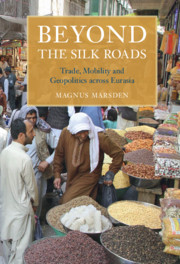
-
- You have access
- Open access
- Cited by 5
-
Cited byCrossref Citations
This Book has been cited by the following publications. This list is generated based on data provided by Crossref.
Montgomery, David W. 2021. Building Pluralism in Central Asia: Outlining an Experiential Approach in Kyrgyzstan. The Review of Faith & International Affairs, Vol. 19, Issue. 4, p. 98.
Karimi, Ali 2022. Information Control in Afghanistan, 1901–1946. Afghanistan, Vol. 5, Issue. 2, p. 172.
Cheuk, Ka-Kin 2022. Diasporic convergence, sustained transience and indifferent survival: Indian traders in China. History and Anthropology, Vol. 33, Issue. 2, p. 279.
Marsden, Magnus 2023. Adjusting scales: Jewish trading networks in and beyond Afghanistan, 1950-present-day. History and Anthropology, p. 1.
Qian, Linliang 2024. The Global Imperative: Chinese Cross-Border E-Commerce and its Political-Economic Implications in a Deglobalising World. Asian Studies Review, p. 1.
- Publisher:
- Cambridge University Press
- Online publication date:
- August 2021
- Print publication year:
- 2021
- Online ISBN:
- 9781108974387
- Creative Commons:
-
This content is Open Access and distributed under the terms of the Creative Commons Attribution licence CC-BY-NC-ND 4.0 https://creativecommons.org/creativelicenses
- Series:
- Asian Connections




